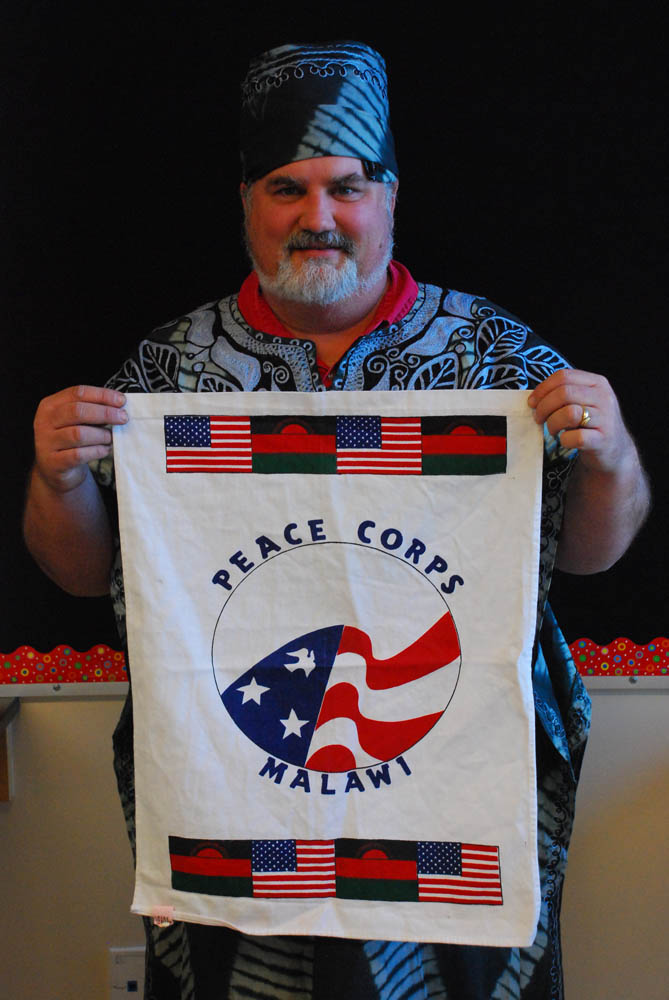
Science teacher Kevin Doyle shows off his Peace Corps attire and commemorative flag.
A famous volunteer organization, the Peace Corps is headed by the United States government. President John F. Kennedy established it in 1961 to improve American relations with the rest of the world. Many college students work in the Peace Corps to experience something different from scholarly work. Since its creation, many young Americans have joined the Peace Corps, including physics and AP Chemistry teacher Kevin Doyle.
Doyle joined the Peace Corps to teach.
“I had wanted to teach as a college professor, but I didn’t like the politics of writing grants to keep doing research.”
Doyle was in Malawi from September of 1996 to December of 1998. He left graduate school because he wanted to participate in a program that let him experience teaching.
“I had applied to different volunteer organizations … and the Peace Corps was the first one that really started matching me up and finding things,” says Doyle.
“It gives you a chance to live a different culture and a different lifestyle,” says Doyle.
Doyle wanted to go to a Pacific Island country, but the Peace Corps chose Malawi for him instead.
A poverty-stricken country in Africa, Malawi has a history of economic hardship, partially because its economy is primarily based on tobacco.
Before starting, Doyle did not even know where Malawi was. Besides suffering from poverty and low life expectancy, the population of Malawi has one of the world’s highest rates of adults with HIV/AIDS.
During his first two weeks in Malawi, Doyle had to undergo thorough language training and culture classes. While there, Doyle lived in a 300-square-foot house with barely enough electricity to power one light bulb.
Doyle remembers, “When I would go into one room and turn on the light while another was on, it would dim for a while until I went to turn it off.”
In Malawi, Doyle’s main job was to teach biology, chemistry, and physics.
He remembers, “The students were less prepared, but they were still open to learning.”
Besides doing that, Doyle trained others to become science teachers and also assisted in agriculture. Doyle tried persuading the Malawian farmers to switch from the typical tobacco crop to different cash crops.
“We were growing bird’s eye chili pepper, which is used in pepper spray,” he says.
Doyle and the farmers made good progress with other crops, but when he came back to Malawi after a year, he found that some of the farmers were still using tobacco. “Change is really hard to affect; there were some people who were growing tobacco and some still in peppers … People change when it is valuable and when it is helpful.”
Doyle’s experience in Malawi was what he called “actually living.” Living in Malawi differed from traveling or touring because it was living like the locals. “I think the biggest effect [from the Peace Corps] is to realize who and what your own culture means to you.”
Doyle recalls, “My students thought it wasn’t lying if you weren’t caught … you say what you think the person wants to hear so that you can get to what you want to do.”
“One of the things they tell you in the Peace Corps is you change and you learn more about yourself than you change others.”
Doyle learned who he was in Malawi and what he really needed in life. The line between wants and needs were very distinguished.
“When I was home I went to a church benefit auction with my parents and there was a Cannondale bike that came up, and it was $200—which was 10 percent of what it should be. That was three months’ pay … When I came back, I didn’t want to spend money on anything.”
“I will always treasure my time there and hope to come back again, maybe not to see the people—they could have passed away, but to see the sights and what it was like.”




